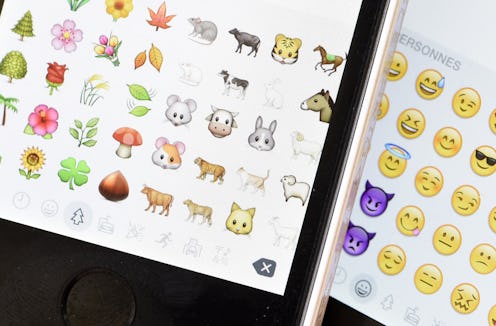Life
Why Are Girl Emoji So Stereotypical?
In the past few years, emoji have become so ubiquitous that it's easy to forget they're an optional app; everyone from your 11-year-old cousin to your technology-challenged father seems to use them these days. Considering their near-universality, you'd think that they would reflect the population that uses them (aka everyone), but the opposite appears to be true. Although the keyboard finally adopted ethnic and racial diversity last year, girl emoji are still stereotypical, and according to research from the always-relevant #LikeAGirl campaign from Always, young women aren't happy about it.
Always surveyed over 1,000 women between the ages of 16 and 24, and they found that the majority of those surveyed are aware of the stereotypes invoked by girl emoji choices — if they're available at all. The vast majority of the emoji depicting women are based on gendered expectations: Painting their nails, getting a hair cut, dancing in a red dress, walking down the aisle, and... That's about it, actually. All the professional and active emoji — swimmer, detective, and even just the act of running — are men, with no option to change the gender.
With that in mind, it probably won't come as a surprise that more than half of those surveyed by Always considered the current female emoji to be stereotypical, and three-quarters stated they would like to see more progressive female emoji, like female athletes. Similarly, 76 percent agreed that female emoji shouldn't be restricted to traditionally feminine activities like manicures, while 67 percent believed that the existing female emoji imply girls are limited in what they can do. The study is accompanied by a video in which girls and young women discuss the state of female emoji, and it doesn't paint a flattering picture.
"There's no girls in the profession emojis, unless you count being a bride as a profession," one teen says with disgust.
The video goes on to show the fruitless search for a non-stereotypical female emoji. One young woman appears about to give up when she comes across the surfer emoji. "That one's a girl," she says before looking closer. "Nope! It's just a guy with long hair."
One girl sums it up perfectly near the middle of the video: "Girls love emojis, but there aren't enough emojis to say what girls do," she says.
Emoji may seem like a small matter, but like all representation, it's indicative of larger problems. The language we use reflects our attitudes as a society, and perhaps more importantly, it serves to reinforce it. When we only discuss women in terms of gendered expectations, we subtly teach girls that these stereotypes have merit — and that's where internalized sexism begins.
Fortunately, emoji may be getting an update soon(ish). Just this week, Google engineer and Unicode president Mark Davis submitted a proposal to create emoji with changeable hair colors and gender, which would allow users to pick and choose the gender they want to use. It may take a while for the proposal to be accepted and implemented, but it's still a step forward in allowing women to express themselves. (I've been waiting for a lady weightlifter emoji for an eternity at this point.) Hopefully, it won't be long before we have all the cartoon female police officers, detectives, and surfers we could want.
Check out the #LikeAGirl video below.
Images: Always/YouTube (2)
